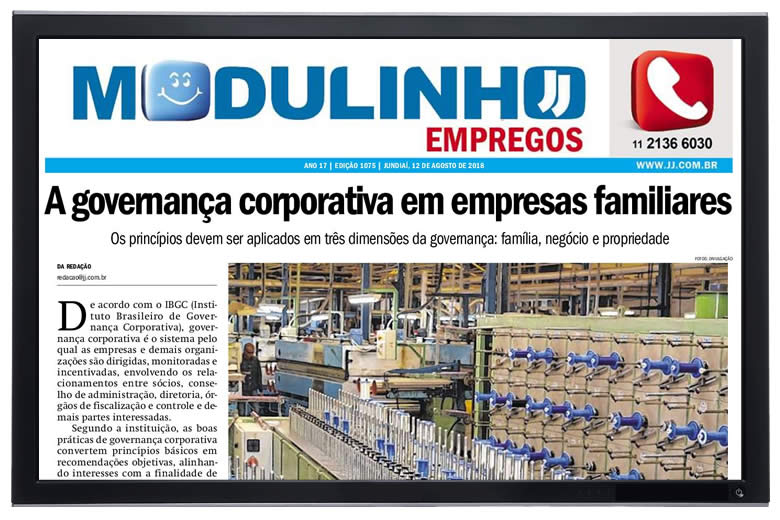Modulinho: corporate governance
Principles should be applied across three dimensions of governance: family, business and ownership
According to the IBGC (Brazilian Institute of Corporate Governance), corporate governance is the system by which companies and other organizations are directed, monitored and encouraged, involving the relationships between partners, board of directors, management, inspection and control bodies and other interested parties. According to the institution, good corporate governance practices convert basic principles into objective recommendations, aligning interests with the purpose of preserving and optimizing the organization’s long-term economic value, facilitating its access to resources and contributing to the quality of the organization’s management, its longevity and the common good.
This means that for a company which believes in and practices governance, there is no hidden agenda. Transparency is part of everyday life. Accountability becomes elementary, a company’s ground zero. Corporate responsibility goes beyond this, and may take into consideration the perpetuity of the company from an economic, social and environmental point of view.
My contact with the subject occurred in 1999, when Mazzaferro, a family company that is a reference in the nylon industry, began the process of succession for the second generation counting on the support of IBGC. At the beginning, the partners were only two, the founder and his wife. Today there are 18 and it would be necessary to create instruments capable of preserving their rights, as well as the perfect continuity of the company. Since then, we have become a case already presented in several places in Brazil.

TRANSPARENCY: The active corporate responsibility goes beyond accountability. It considers economic, social and environmental perpetuity.
Planning was the key word for this process. We operate in the three dimensions of governance: family, business and property. The challenges were big. The families who own closely-held companies are not always technically and psychologically prepared to implement a corporate governance system. The founder usually does not like to face issues related to the formalization of the company, the will, the segregation of matters related to the family from those related to the business, and having total transparency in the economic management.
Mazzaferro had the courage and luck to start this process in 1999, long before the founder, Nello Mazzaferro, passed away in 2012. The company continued to operate without any discontinuity or questioning by the heir partners or any other stakeholder. The benefits were many, such as the perpetuation of values, harmony among family members, tranquility in the succession process, capital management and, especially, the continuity of the business.
In this sense, besides the professionalization of management and the implementation of a code of conduct, the creation of a board was fundamental. It is necessary to have competent, independent and remunerated professionals. About 70% of the board’s time is now spent on strategic matters, and the other 30% on tactical ones. There is a pre-defined annual agenda that addresses strategy review, strategy deployment, budgeting, talent management, risk management, among others. The board members have free access to the company’s executives and data and are also evaluated by the chairman.
The journey requires effort, but holds many rewards. The corporate governance system makes the company completely transparent at all levels, facilitating the relationship between all parties involved. The company wins, the community and, of course, the family, which is free of conflicts.

Claudio Mazzaferro is CEO of Mazzaferro Monofilamentos, speaker and board member certified by IBGC.

Published in Modulinho Empregos newspaper (Jundiaí, year 17, number 1075) on August 12th, 2018:
pt.calameo.com/books/00213909820f1a01c89a0 | www.jj.com.br


